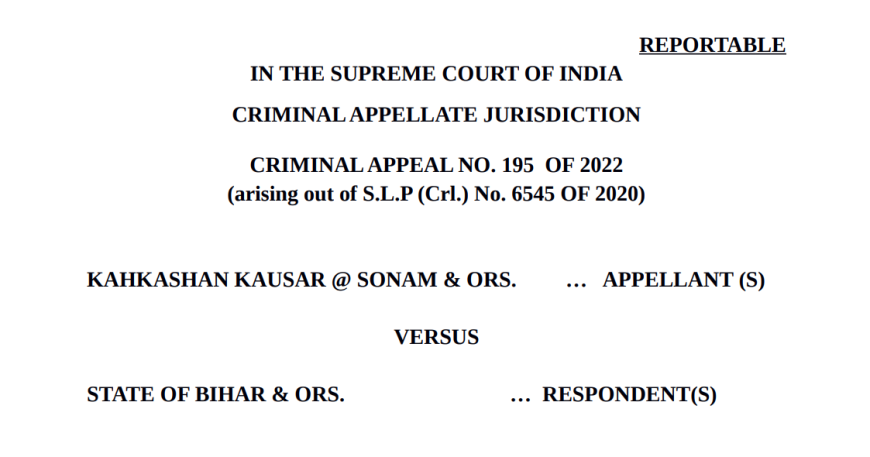In Matrimonial disputes, it has become fashionable for the wife to blame her husband and her in-laws for Domestic Cruelty, and the police feel duty bound to register the FIR against the husband and her in-laws without conducting a preliminary inquiry and without applying the mind. This is generally a phenomenon in the Urban Centers. In rural India, the women are suffering extreme forms of domestic violence. I am very cautiously and responsibly using the word Urban Centers. On more than one occasion the apex court has come down heavily on the law enforcement agencies that they should be mindful when there are omnibus allegations of Domestic Cruelty against in-laws. These allegations are primarily made to harass the in-laws and the Husband’s family.

Rightfully the Supreme Court has called the misuse of provision 498-A of IPC by the disgruntled wives as legal Terrorism. And in one of the recent cases the High Court of Calcutta called the respondent woman that she unleashed Legal Terrorism by misusing the provisions of Domestic Cruelty.
The case at hand is also riddled with similar circumstances, where the appellants approached the Supreme Court when the High Court did not quash the Criminal Proceedings for Domestic allegations against the In-laws. The High Court did not appreciate the case of the Appellants, and ultimately the Supreme Court quashed the FIR against the in-laws.
At times it is definitely possible that the aggrieved party (wife) might have been subjected to Domestic Cruelty by the husband, but the wife intends to take revenge against the whole family of husband and drags the in-laws and siblings of the husband too, who have had nothing to do with the Domestic Cruelty.
Aggrieved parties like the in-laws and the siblings may approach the Higher Courts invoking the High Court’s inherent powers to quash the said Criminal Proceedings and the FIR.
In the instant case the in-laws, not the husband have applied for the quashing of the criminal proceedings against them and the husband was not a party to the petition in the quash proceedings.
Taking into consideration, the facts and circumstances of the case in question the Supreme Court has quashed the FIR against the In-laws and made some interesting remarks which have a great precedential value.
The factual matrix is that the respondent wife Soni has registered a complaint of Dowry harassment against the husband and the in-laws and others. Though the trial judge has concluded that there is no material evidence against the in-laws, he went ahead and took cognizance of the matter. This makes sense, because trial judge wanted to conduct trial and that he would have wanted to discharge the in-laws at the end of the trial. The trial court has no power to quash the proceedings.
When the accused – Brother in-law, sister-law and Mother in-law approached High Court with a prayer to quash the FIR and the Criminal Proceedings the High Court concluded that there is a prima facie case. Hence, this appeal before the Supreme Court.
Court’s observation:-
- The Incorporation of 498-A in IPC was aimed at preventing cruelty by facilitating a rapid state intervention.
- But, in recent times there is a greater disaffection and friction surrounding the institution of marriage.
- This has resulted in an increased tendency to use the provisions of 498 A as an instrument to settle personal scores against the husband and his relatives.
- The Court goes on to quote – Rajesh Sharma and Ors. Vs. State of U.P. & Anr, Arnesh Kumar Vs. State of Bihar and Anr, Preeti Gupta & Anr. Vs. State of Jharkhand & Anr, Geeta Mehrotra & Anr. Vs. State of UP & Anr, K. Subba Rao v. The State of Telangana to drive home the point that how the provisions of Domestic Cruelty are being misused against the husband and his relatives and that how relevant it is to the present case.
- The perusal of FIR proves that the allegations are general in nature against the appellants, and the complaint that they have harassed her mentally and threatened her of terminating the pregnancy are nothing but omnibus allegations.
- The complaint fails to establish specific allegations against the in-laws.
- Allowing the prosecution in the absence of clear allegations against the in-laws is simply an abuse of the process of law.
- In the absence any specific role attributed to in-laws it would be unjust to force them to go through the tribulations of a trial.
- This court on varied instances highlighted that a criminal trial leading to an eventual acquittal also inflicts severe scars on the accused and such an exercise must be discouraged.
- Hence, setting aside the order of High Court, and allowing the appeal and quashing the FIR and proceedings.
As long as the front-line personnel of police machinery are not educated on basic procedures of Law, the abuse of not only this law but any law for that matter would continue. Other than the incompetency of the police machinery there is this concern of Corruption among them. And this issue is not going anywhere anytime soon.



